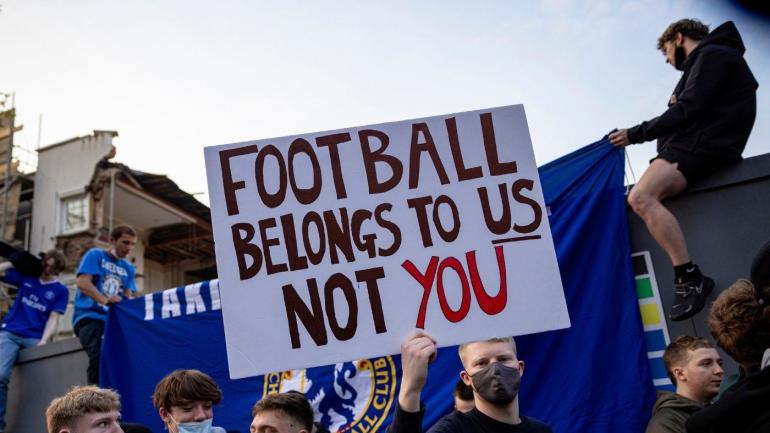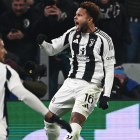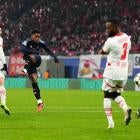
A momentary schism it may have been but European club football will not forget the so-called "Dirty Dozen" as quickly as their plan was discarded to the footballing dust heap. They played their hand and failed dismally.
The 12 clubs -- England's big six and trios from Spain and Italy -- catastrophically misread the room, believing that their fans were willing to turn their back on the game for a few bucks more. In doing so they may discover that all the leverage they had accrued in years of negotiations with UEFA over the future of the Champions League has been frittered away.
From the outset it was remarkable how little thought had been given to painting the picture of the Super League as a product that fans should gravitate towards. When news did eventually drop around midnight in Europe supporters of Arsenal, Manchester City and Liverpool were greeted with an announcement that carried no words from senior executives at their club. Instead Joel Glazer, owner of their great rival Manchester United, was laying out his vision. The same was true in Italy and Spain as Super League vice president Andrea Agnelli of Juventus and president Florentino Perez of Real Madrid put their names on boiler plate statements.
That was all they would tell fans. For some, the same was true of the players. It remains remarkable that Arsenal came and went as members of Europe's elite club without ever once having a conversation with Mikel Arteta's squad about what membership would entail.
Craving even more coverage of the botched Super League plans and more? Listen below and subscribe to ¡Qué Golazo! A Daily CBS Soccer Podcast where we take you beyond the pitch and around the globe for commentary, previews, recaps and more.
In years to come, communications professionals will study the Super League as a masterclass in mismanagement. Premier League clubs would brief in private, doing their best to convince reporters of the sunlit uplands that lay ahead for their clubs but none of the owners came out to speak until their mea culpas when their grand plan lay in tatters. It was grimly appropriate that what could be the competition's final statement came with a word document riddled with typos. There was not even sufficient consideration of message discipline to stick the logo at the top of the page.
The closed shop was destined to fail in Britain, particularly when prime minister Boris Johnson scented an opportunity for political point scoring that was too good to pass up. His robust and wholehearted backing of the Premier League to take whatever action they wanted, coupled with a willingness to explore legal avenues that would block the six clubs from taking part in the Super League, was a hammer blow to the breakaway.
Yet the speedy collapse of the league will not mean everyone is happy to forgive and forget.
Olive branches were swiftly offered by UEFA, whose president Aleksandar Ceferin was keen to play the role of peacemaker as the first cracks appeared on Tuesday. "It is admirable to admit a mistake and these clubs made a big mistake," he said as the Premier League sides began the exodus from the Super League. "But they are back in the fold now and I know they have a lot to offer not just to our competitions but to the whole of the European game.
"The important thing now is that we move on, rebuild the unity that the game enjoyed before this and move forward together."
Equally, he and other senior figures at UEFA and across football will not forget the feelings of betrayal that Ceferin laid out in such devastating fashion on Monday morning. Many clubs are talking about rebuilding trust with their supporters after their humiliating climbdown but it will be no less mammoth a task to do so with fellow executives.
Within the corridors of those 14 Premier League clubs that were left out, there is naturally a plurality of views, an acknowledgement that the competition will not be the same success without its biggest names coupled with a desire to punish them for their transgressions.
There is ground for doing the latter, Premier League Rule L9 states that clubs need prior written approval of the board to enter into any competition other than UEFA's European competitions and domestic cups. The points deductions or fines that former Manchester United defender Gary Neville was calling for on Sunday would certainly act as a significant warning, but there are those within the 14 who doubt it would really hit the architects of this plan in any meaningful way.
Those owners who cooked up these plans can expect to feel the full fury of their fans in the coming days. Already, plans are afoot for Arsenal's home game against Everton on Friday to be preceded by a protest against owner Stan Kroenke, under whose stewardship the Gunners have declined to such an extent that the 73-year-old can only guide his club back to the elite through back channel deals. Already, efforts to depose Kroenke Sports and Entertainment from the Emirates Stadium have drawn the support of former players such as Ian Wright.
"We want to see a personal apology from Stan Kroenke," Tim Payton of Arsenal Supporters told CBS Sports. "Stan Kroenke has never met an Arsenal fan. He should now sit down and listen to our views, which may well lead him to conclude that he is not the right custodian for Arsenal Football Club."
It is a message that is being echoed across the Premier League. The Chelsea Supporters Trust has called for the resignation of chairman Bruce Buck and chief executive Guy Lawrence. After executive vice chairman Ed Woodward announced his resignation amid the turbulence, Manchester United Supporters Trust have urged owning family the Glazers to "change the current path of their legacy and open the door to supporter shareholding with full voting rights".
Woodward may not be the only executive to fall. Speculation has mounted outside AC Milan and within as to whether chief executive Ivan Gazidis will remain following the collapse of the competition.
While there is a clamor for change in ownership across the European game, particularly in England, there is fear of simply replacing one indifferent billionaire with another, or perhaps one that brings with them serious ethical questions such as those faced by Newcastle United supporters when Saudi Arabia backed a potential takeover.
Instead, British supporter groups are putting their hopes in the U.K. government's fan-led review, which culture secretary Oliver Dowden insisted will take place even after the breakaway league's collapse. Previous Labour Party manifestos spoke of adding fan voices to the board and there is even hope that political intervention could bring about a version of Germany's 50+1 rule that mandates a controlling stake for supporters.
I welcome last night’s announcement. This is the right result for football fans, clubs, and communities across the country. We must continue to protect our cherished national game.
— Boris Johnson (@BorisJohnson) April 21, 2021
Away from the boardrooms, there is the matter of what happens in European competition. The breakaway clubs had already gotten much of what they wanted with a restructured Champions League format, due to be implemented in the 2024-25 season. The "Swiss system" is a dramatic redrawing of the landscape with a 36-team league in which only a third of teams will be eliminated before the knockout stages.
Those who protested against a closed shop and clubs with brand value but questionable sporting success pulling up the ladder with them might also note that two slots will be awarded to teams who failed to earn a Champions League spot in the previous season but have a high enough coefficient ranking (based on their performance in years gone by) that their place in the Europa League or Europa Conference can be upgraded. It may not be as extreme as the absence of relegation for founder members of the Super League but it is an insurance policy against on pitch failure that owners wanted, even if one this is not quite so extreme.
There is another truth at play in the Champions League. For all that there was a widespread, deeply felt disgust at the Super League's proposal there were a minority to whom this idea held some appeal. In a poll conducted by Savanta ComRes for the BBC late last year almost half of younger supporters expressed an interest in a continental competition. The likes of Andrea Agnelli and Florentino Perez ham-fistedly made the point that the sport needs to adapt to engage with a younger audience.
There are certainly ways that that can be done without rupturing centuries of history -- if Premier League clubs are so interested in getting 16-24-year-old fans watching their product legally, they might want to consider how many of that age group could afford the myriad subscription packages and season ticket that would be required to deeply invest in their local teams -- but there is an underlying truth that there are those football fans who saw a proposal that meant more games between the biggest teams in Europe and liked the idea.
They are not wrong for thinking that.
The Champions League reforms may offer that, though equally a group stage with 24 qualifiers does seem destined to bring with it its fair share of dead rubbers. Whatever comes next for European football, it is clear it will have to respect the generations of heritage that have made this sport so beloved globally while also endeavoring to offer more occasions in which the very best face off in a meaningful way.
What those breakaway clubs failed to understand was that the product they were offering fundamentally failed to be meaningful when failure on the pitch counted for nothing. They may have envisaged a competition without meaningful consequences but in trying and failing to tear apart the sport they may yet discover there are severe ramifications ahead of them.
















